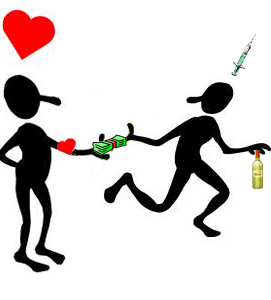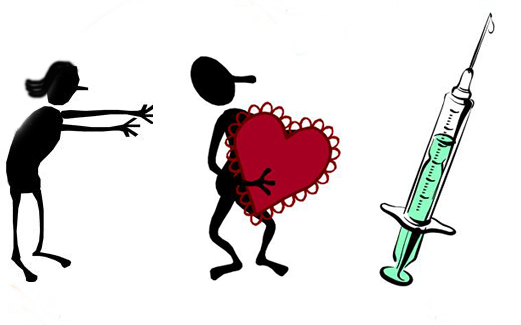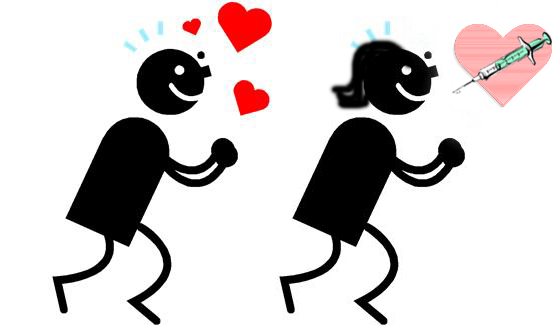Are You An Enabler, Codependent On A User?
ARE YOU AN ENABLER, CODEPENDENT ON A USER? THE 10 MOST COMMON REASONS (ISSUE 105)
By Diane Gold
Are you an enabler? Are you in love with or do you love someone who is in love with substance whom you help get it?
Let’s look at the term “enabler” and give it a definition so that we are all using the same meaning.
 According to the dictionary, an enabler is a person who makes something possible. In the habit sense, it is a person who assists a habitual behaviorist to get her reward from some negative behavior.
According to the dictionary, an enabler is a person who makes something possible. In the habit sense, it is a person who assists a habitual behaviorist to get her reward from some negative behavior.
Many enablers don’t realize they are enabling. They are so wrapped up in another person who is wrapped up in indulging behavior that they don’t see their behavior as a habit that is hurting them both. In fact, most enablers believe they are helping the other person, blind to the dependence that obvious to others.
Almost 10 years ago, for almost 10 years, I enabled the person with whom I lived. I used my money, my credit and my organizational skills to make sure he had his drugs, his alcohol, commercial property to conduct business and a nice place to live. In my case, it was a little convoluted because I was jealous of his using drugs and alcohol without me, so I used them when I saw his use. I was codependent with a touch of substance abuse.
One of my remedies was to go into the bedroom and lock the bedroom door and put the pillow over my head until I fell asleep. VERY DIFFICULT, but effectively removing me from that situation!
Personally, I was enabling this man to use drugs and alcohol to insure my own security. I was afraid to cut the money off and say,
“No more,”
since I was not willing to see the truth, that the man with whom I lived was interested in substance before me. What made it even harder was that we were business partners. And, if I stopped facilitating the business, I would be looking for a new career. I was afraid of that change, too.
A decade later, it’s easy to see now what my motives were then and the enabling behavior that went on, the excuses I made for this man’s violence that went along with my actual forgiving, “healer” nature.
Since that time, after removing myself from the situation, I can evaluate the many stories I hear about the difficulty in saying “no” because this response causes so much emotional pressure. I can relate, and I can suggest.
TOP 10 REASONS WE GIVE OURSELVES TO MAINTAIN THE ENABLER ROLE
Here are a list of things that go on in our head that keep us enabling. Do you recognize any?:
 1) If I don’t give my loved one the money for her habit, she might get arrested or get shot,
1) If I don’t give my loved one the money for her habit, she might get arrested or get shot,
2) If I don’t give my loved one a ride to her dealer’s house, she will walk at night in the bad neighborhood and might get raped,
3) If I don’t give my loved one money for her habit, she won’t love me,
4) If I tell my loved one she’s overweight or stop buying her the donuts and ice cream she loves, this will hurt her feelings; so I won’t say anything,
5) If I don’t give my loved one a ride when she calls for a ride at any hour, she might get arrested walking in the street and then raped in jail,
6) If I don’t let my loved one live at my house and she gets hurt or killed on the street, it’s my fault,
7) I’m married to her, so I have to pay for her habit. After all, “to love and to cherish, in good times and bad,”
8) If I don’t give my loved one money, she might leave me,
9) Even though I know my loved one is stealing money from me, I won’t say anything because she might hit me or hurt our child.
10) My loved one came to me and trusted me with her substance problem so I have to give her money for drugs because I can’t betray her trust.
BEING BRAVE
 In the same way that some cultures send a young person out to prove adulthood, we must allow our loved ones to fend for themselves or work on themselves, or they will never prove themselves to themselves. If we want to save ourselves, we must, in turn, remove the magnetic pull they have on us and let go, if we are to find our own way.
In the same way that some cultures send a young person out to prove adulthood, we must allow our loved ones to fend for themselves or work on themselves, or they will never prove themselves to themselves. If we want to save ourselves, we must, in turn, remove the magnetic pull they have on us and let go, if we are to find our own way.
Letting go doesn’t mean not see our loved one, necessarily, but it does mean take hold of our behavior and put down our enabler role. We must be massively brave and courageous to do it, since all sorts of emotions pull at us to enable and we can’t fathom not seeing our loved one.
In more cases than not, it may be necessary to limit the times we see our loved one while we are working on ourselves and the loved one is working on herself. Because we are adults, we don’t get supervised visits, but that may be what we need. It’s the same as when we are stopping abusing alcohol or drugs. Many of us have to avoid going places that serve alcohol or market drugs. We may, in the future, choose to be in places with alcohol, although we may choose never again to be in places that market drugs. Until we are more evolved in the process, and our habit is replaced with another, we may need to plan where not to go. I can vouch for the benefits of this separation!
CONCLUSION
Being an enabler can be borne out of wanting to help, which is a natural human feeling. It usually comes from some type of insecurity as does the craving behaviors, themselves. Many of us feel a calling to ease the pain of others. It goes too far when we get lost in someone else’s negative behavior to the point where we stop our own progress and hurt the person we are attempting to help.
We are not alone, and being codependent is not shameful. When we see our behavior clearly, we can change our habit and be happier.
ACTION STEPS, INSTEAD OF ENABLING
Here are some action steps we can take instead of continuing the codependent behaviors we usually do.
1) Keep no money in the house, so that, when asked, you can say you don’t have any money. This solution precedes the direct “no” response which you may have to work up to. This is a step of blind faith that you will survive saying “no.” I can vouch for it. You will survive it!
2) When your someone asks you to come with your car to get her at an inconvenient or inappropriate time, you can say you are sleeping and end the call. You know your person is safe, more or less, since you have just heard from her. Your person will find a way home.
The first time is the hardest because all those feelings of responsibility for harm come up. I can vouch for it. You can do it!
3) Seek a support group, either online which is immediate, or at a group location. It helps to listen to others in similar situations. Or confide in a support person, and say you have discovered you are an enabler. If it’s a friend, do not let the friend talk you out of your realization. Here’s an interesting online option: http://www.smartrecovery.org/resources/family.htm
![]()
WORK WITH US
If you would like to set up a consult or ask a question about your situation, please go to our Contact Us page. Even if you are confused about your situation, you are welcome to reach out here. Please include the best time to contact you.
![]()
SUGGESTED READING
I do not prefer the 12-step program that is mentioned in the recommended article below. However, the eloquence with which this writer orates is reason enough to read the passage. Please start with the words,
“Over the last 28 years,”
if you wish to avoid another statement with which I take issue.
http://the12stepbuddhist.com/codependent-once-more/
FEEDBACK
Please leave a comment and LIKE.
DIANE GOLD, AUTHOR
Diane Gold, Founder of Warriors of Weight, Turning Habits Into Health, is a mentor in tai chi, kung fu and meditation, a music, fitness and stress expert, dedicated mom, studying plant-based nutrition and habit change.
A lot of her topics deal with personal development and self-evaluation and the fact that all habits take different shape. She says,
“One of the hardest habits to spot is that of being an enabler. All we know is that we have a loved one and that we want to heal the loved one. Enablers get so caught up in another person’s life that they forget that they cannot fix another person. Only we can fix ourselves.
“It takes courage to look in the mirror when that means admitting we might have a habit that needs replacing. Most of the time, we have a little voice on our shoulder that has told us something is not right. And most of the time, if we are lucky enough to be free, we can get some support to replace our old habit with a new one.
“In order to see ourselves, we usually have to step back. Then, we can follow some simple steps which are different from the old steps we took a moment ago. Being codependent is no one’s fault, and no one’s to blame for developing the enabler habit. If we see it in ourselves and really want to help our loved one, it might be time to replace it.”







